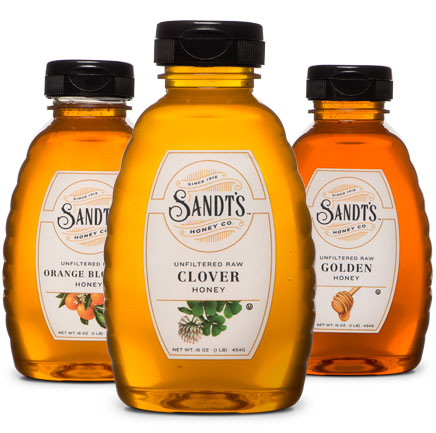From Bee to Bottle (5 min read)
Posted by Ellie C. on Mar 1st 2022
Real Ingredients: Sandt’s Honey
As you know, we use only real, quality ingredients that are familiar and widely available. We source from suppliers who share this commitment to their craft. In most of our granola varieties, we use clover honey sourced locally from Sandt’s Honey in Easton, PA. We had the opportunity to tour the facilities and learn more about the process from the owner, John Torrillo.
Sandt’s Honey was founded in 1918 by Floyd Sandt. Floyd and his family managed over 400 hives in Easton as well as supplied equipment to other local beekeepers. In 2015, the Torrillo family purchased the company from the Sandt’s, continuing on Floyd’s mission of making “Unfiltered Raw Honey – As the Bees Intended.”

What’s Unfiltered Honey?
It’s a simple process that ensures genuine, pure honey in its most natural and flavorful state. This is where the beekeeper scrapes away the wax caps from the honeycomb and places it into a cylindrical machine displacing the honey from the comb.

(Extraction of wax capping from honeycombs)
The honey is then transported to Sandt’s where it is liquified at a temperature of 140 degrees Fahrenheit. Imagine a giant sauna with a couple drums worth of honey warming overnight. This process also cleans the honey without harming its nutritional or mineral content. Before being bottled, the honey is strained to rid of foreign particles from the bee’s natural environment.
It’s a simple and pure process with little intervention from man or machine. This “less is more” method allows the honey’s natural flavor to be more pronounced when used as an ingredient in our granolas.
Sometimes a hands-off approach is challenging to see through, but John’s commitment to unfiltered, natural honey guides him to processing the best-tasting honey on the market.
One of our values is real artisanry and its importance in making quality food. You mentioned larger honey operations and how they’ve strayed from this value. How would you say your production methods differ and are more artisan than other processors? How do you think this impacts the quality of your honey?
“All the honey Sandt's packs is simply strained unlike the majority of commercial packers, which take their process a step further by filtering the honey. They do this primarily to reduce the tendency for honey to naturally re-crystallize.
Filtering requires heating honey to higher temperatures, approximately 165 degrees Fahrenheit, and processing it through a very fine filtering material – a food grade version of diatomaceous earth. It is the same material used to filter and clean swimming pool water! For a clean swimming pool, diatomaceous earth is great for removing particles down to 3-5 microns, well below what the naked eye can see. When honey is filtered using diatomaceous earth, all the “good stuff”—the pollen, enzymes, antioxidants, and vitamins— is removed.
Unlike the majority of honey sitting on store shelves today, we at Sandt’s do not alter any of our honey. Nor do we add extenders, additives, or anything else. Every bottle of Sandt’s honey is genuine, pure honey.”
While much of the honey on the market is blended, we use your 100% clover honey. What makes clover honey better than blended varietals?
“Clover honey, or any monofloral honey, is going to be more expensive than a multifloral blend of a variety of honeys. A monofloral honey is a type of honey which has a distinctive flavor or other attribute due to its being predominantly from the nectar of a single plant species. Consequently, beekeepers must position and if necessary, relocate their hives to harvest honey from a specific floral source which can be very time consuming and costly. To this point, many of the beekeepers we work with move their hives via tractor trailers all over the country to gather honey from the varying seasonal crops and floral sources.”
You’ve worked in several industries, what is it that you like about the artisanal food industry compared to others?
“One of the best features of working in the food industry is the opportunity to interact with many different customers and personalities. Our honey is purchased by local individual walk-ins, food distributors in NYC and Philadelphia that serve retail stores and restaurants, as well as many commercial clients that use our honey as an ingredient in their end product such as mead, BBQ sauce and granola. Honey naturally connotes a positive feeling, and we get to experience that on a daily basis with our customers.”


